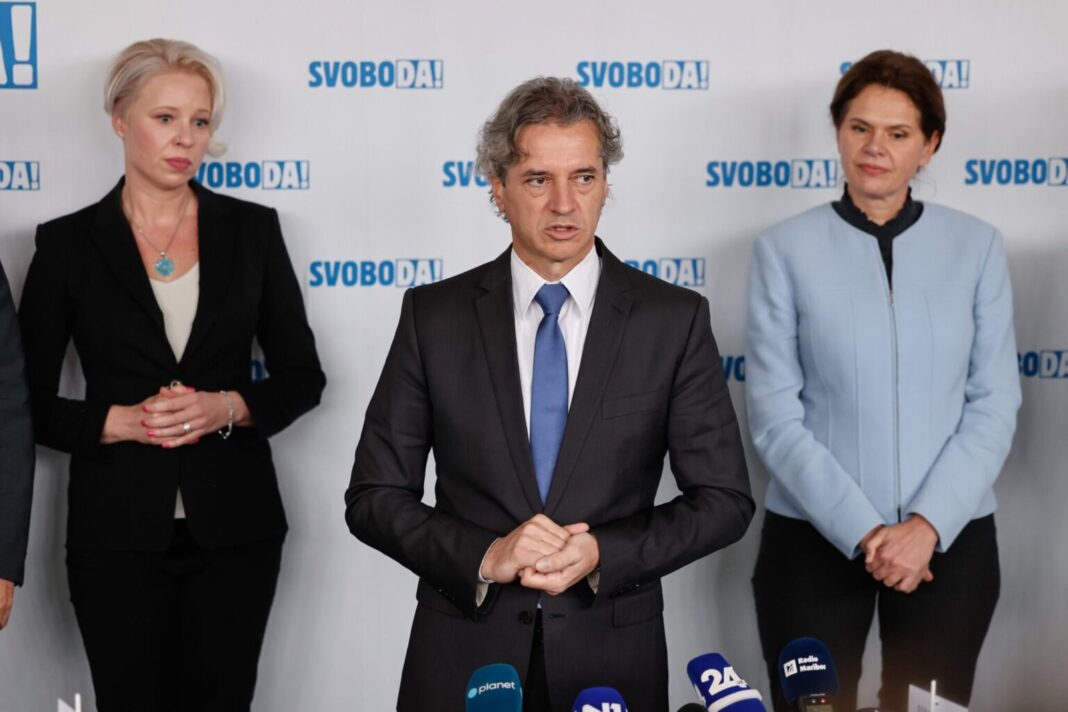By: Tanja Brkić (Nova24tv.si)
In a short article that was presented in the section “Highlighted” (Izpostavljeno), the national media outlet RTV Slovenia presented a brief timeline and the key events that marked the process of developments and decision-making on the amendment to the Radio-Television Slovenia Act. This was the first thing on Robert Golob’s list of priorities since the pre-election period and was, therefore, also treated under the urgent procedure after he came to power. And yet, their bill was unconstitutional, so the Constitutional Court suspended its implementation. The government asked the Court to rule on its implementation again, but the situation became complicated when it was revealed that one of the writers of the bill was a Constitutional Court judge, who should have recused herself in this case. It should soon become known how things will proceed.
In the section “Highlighted” on RTV Slovenia, the author of this article, Igor Pirkovič, summarised what is happening with the amendment to the Radio-Television Slovenia Act, the constitutionality of which has not yet been decided by the constitutional judges. The decision is still pending, and the judges are under pressure from the government to rule as soon as possible. Who else should be excluded from the decision, apart from the judge who was involved in writing the law? The Golob government claims that it is doing this for the sake of democracy in the broadcasting industry, but the fact is that our national media outlet has never been so democratic – new, different faces have emerged to satisfy other tastes. Isn’t that what public television is all about?
The amendment to the Radio-Television Slovenia Act was already at the forefront before the elections, and Robert Golob had repeatedly stressed that if his party were to win the elections, they would take it up immediately. On the 1st of July, the Golob government submitted a proposal for amendments to the Radio-Television Slovenia Act to the National Assembly, proposing that it be dealt with under the urgent procedure.
Commissioner’s meeting with the disobedient judge
Not even some reservations from the Legislative and Legal Service of the National Assembly were able to stop the Parliament from voting on the law, and the coalition voted the law through. Even a referendum initiated by the Slovenian Democratic Party (Slovenska demokratska stranka – SDS) could not stop the law, but the Constitutional Court suspended its implementation. The coalition is in a hurry, but no one is above the Constitutional Court. Very conveniently, the Vice-President of the European Commission, Vera Jourova, also visited the Court during its time of considering the amendment, which was perceived by a section of the public as her exerting pressure on the judiciary. Namely, during her visit, she met with predominantly left-leaning politicians and their aides. During the term of the previous, Janša government, she was one of the main tools of the left opposition, its “civil society,” and the academy in the fight to bring down the government and retake power. This is what made it all the more “suspicious” that she visited the Constitutional Court at the very time when the Radio-Television Slovenia Act was being decided on, and that she also met with Judge Matej Accetto, who voted to suspend the Act.
There have been numerous pressures exerted on the Constitutional Court
According to the media outlet Požareport, the President of the National Assembly, Urška Klakočar Zupančič, asked the Constitutional Court in February to look at the case file again, while Golob has repeatedly called for a decision to be made as soon as possible, and it is well known what kind of decision he wants, and the government has proposed that the RTV employees who are in favour of the amendment should be called as witnesses before the court. After that, the “civil organisation” the Legal Network for the Protection of Democracy (Pravna mreža za varstvo demokracije) intervened in the Court, claiming that the amendment of the law was “urgent”. The Constitutional Court has hurried up and proceeded with the constitutional review of the Radio-Television Slovenia Act, but it is not yet clear whether the Constitutional Court judge Neža Kogovšek Šalamon, who is partly employed at the Peace Institute, which is part of the Legal Network for the Protection of Democracy, which wrote the amendment to the Act in question, will remain part of the decision-making team. Golob admitted this in an interview on RTV Slovenia, so the biggest question is – how is it possible that Judge Kogovšek Šalamon could have been deciding on the law in this case when she is so involved?
Peter Gregorčič told RTV that if the Constitutional Court judges had not disqualified the judge, the European Court of Human Rights would certainly have condemned it, after consulting legal experts. As the author of the article pointed out, there is a law at stake, which was adopted under the urgent procedure on the grounds that democracy is at risk because of the previous one, but is this really the case? RTV Slovenia has been given a few new faces, and with that, the diversity it needs to cater to different people and tastes. And if anything, offering diversity and including different minds is actual democracy, and not the “one belief system” that the Golob government wants to achieve. As the author of the article concluded, it is important for public television to satisfy the people and not the governments, because if the latter were the case, there would indeed be something wrong with democracy.

